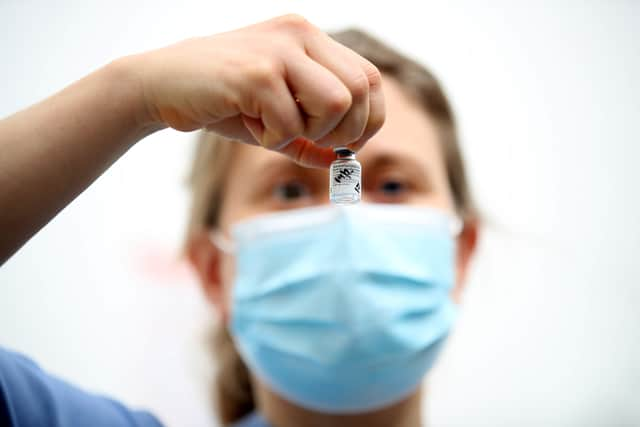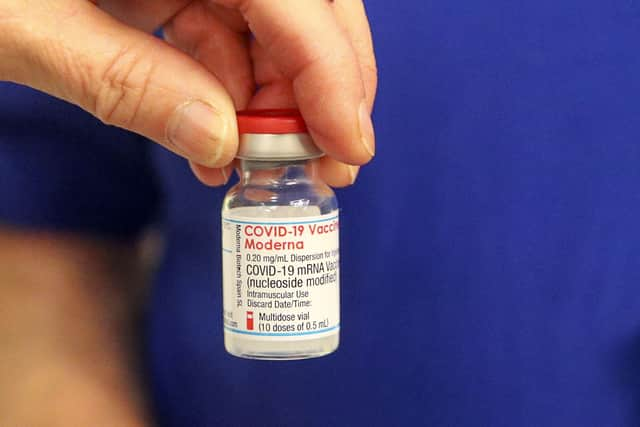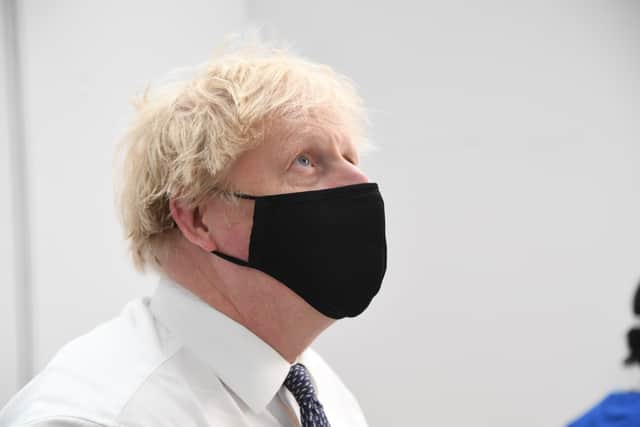More than 70% of people in NI have received at least one Covid-19 vaccine jab confirms Health Minister Robin Swann
and live on Freeview channel 276
To read more about this story please scroll down.
LIVE UPDATES: Coronavirus NI - 70% of Northern Ireland population have received first Covid-19 jab
70% of Northern Ireland population have received first Covid-19 jab


More than 70% of the adult population in Northern Ireland have received the first dose of their Covid-19 vaccination.
Health Minister Robin Swann said over 40% of the population are now fully vaccinated.
He also announced that in order to maintain the programme’s momentum, the vaccination programme will be extended to the 18-24-year-old age group “in the very near future”.
“Alongside vaccination, contact-tracing, testing and self-isolation following a positive test remain the cornerstones of our ongoing public health response,” he said.
“I would again appeal to the public to work with us and keep playing their part in preventing the spread of the virus.
“That’s how we keep each other safe and protect the hard-won progress we have achieved.”
Rapid tests are being actively offered to a range of workforces and sectors of the economy.
In addition, members of the public can now access these tests free of charge.
These can be ordered online and will be delivered to home addresses, or can be collected from number of locations.
Mr Swann described testing, vaccination and contact tracing should be seen as “vital lines of defence against Covid-19”.
“Alongside these, we must keep sticking to the public health basics, social distancing, limiting contacts with others, wearing face coverings, and washing our hands regularly,” he said.
“Always remember that outdoors is safer than indoors and that ventilation, a good supply of fresh air, can reduce the risk indoors. Keep windows and doors open where possible and avoid cramped, crowded settings.”
Wednesday saw the eighth consecutive day in Northern Ireland where no further deaths of patients who had previously tested positive for Covid-19 were notified.
The Department of Health said another 66 positive cases had been confirmed, while there were 28 Covid-positive patients in hospital, of whom two were in intensive care.
A trial has found that the Moderna Covid-19 vaccine stops the transmission of the virus in people aged 12 to 18


A trial has found that the Moderna Covid-19 vaccine stops the transmission of the virus in people aged 12 to 18.
This means the United Kingdom has taken one step closer towards rolling out mass vaccination of adolescents.
Like Pfizer, Moderna says its vaccine, formally called mRNA-1273, was 100% effective in trials in young people.
In a trial of 3,700 young people aged 12 to 18, there were no symptomatic cases of Covid-19 among those who received two doses of the vaccine.
“We are encouraged that mRNA-1273 was highly effective at preventing Covid-19 in adolescents. It is particularly exciting to see that the Moderna Covid-19 vaccine can prevent Sars-CoV-2 infection,” said Stéphane Bancel, the chief executive of Moderna.
“We will submit these results to the US FDA and regulators globally in early June and request authorisation. We remain committed to doing our part to help end the Covid-19 pandemic,” she added.
Three-quarters of adults have Covid-19 antibodies, data suggests


More than three-quarters of adults in England, Wales and Northern Ireland are estimated to have antibodies for the virus which causes Covid-19, new figures suggest - writes Ella Pickover, PA Health Correspondent.
The presence of Covid-19 antibodies implies someone has had the infection in the past or has been vaccinated.
New figures from the Office for National Statistics (ONS) suggest 75.9% of adults in England would have tested positive for antibodies in the week beginning May 3.
In Wales, an estimated 76.6% have antibodies and 75% of adults in Northern Ireland are estimated to have antibodies.
Among adults in Scotland, 68.6% were estimated to have Covid-19 antibodies in the week beginning May 3.
It takes between two and three weeks after infection or vaccination for the body to make enough antibodies to fight the virus.
Antibodies then remain in the blood at low levels, although these levels can decline over time to the point that tests can no longer detect them.
The latest estimates from the ONS are based on a sample of blood test results for the week beginning May 3.
The ONS said that in March 2021, antibody positivity decreased among people aged over 80 years. A similar decrease was seen in those in their 70s at the end of March and those in their 60s in April.
Antibody positivity has since risen and continues to rise in these older ages.
The ONS said that this is likely to reflect the increase in people receiving the second dose of a Covid-19 vaccine.
Kara Steel, senior statistician for the Covid-19 Infection Survey, said: “We are still seeing high levels of antibodies against Covid-19 across the UK which have continued to grow.
“In England, three in every four adults would now test positive for antibodies, mainly as a result of vaccination.
“We have now collected over 400,000 blood samples from our survey participants and these are invaluable to helping us understand protection against the infection within the community.”
The figures reflect the ongoing impact of the vaccine rollout across the UK, in particular the increasing number of people who have received both doses and are now fully vaccinated.
Figures from the Government show that more than 61 million vaccines have been administered across the UK, including 23 million second doses.
Once infected or vaccinated, the length of time antibodies remain at detectable levels in the blood is not fully known.
It is also not yet known how having detectable antibodies, now or at some time in the past, affects the chance of getting Covid-19 again.
The ONS estimates are for people in private households and do not include settings such as hospitals and care homes.
Dominic Cummings: when public needed us most, Government failed


People died unnecessarily because of Government failings during the coronavirus pandemic, Dominic Cummings told MPs.
Boris Johnson’s former aide said he was sorry that ministers, officials and advisers had fallen “disastrously short” of the standards the public should expect in a crisis.
Mr Cummings was giving evidence to the Commons health and science committees with No 10 braced for explosive claims about the Prime Minister’s handling of the pandemic.
The former adviser, who left Downing Street last year after a behind-the-scenes power struggle, told the MPs: “The truth is that senior ministers, senior officials, senior advisers like me fell disastrously short of the standards that the public has a right to expect of its Government in a crisis like this.
“When the public needed us most the Government failed.
“I would like to say to all the families of those who died unnecessarily how sorry I am for the mistakes that were made and for my own mistakes at that.”
The Government was not operating on a “war footing” in February 2020 as the global crisis mounted and “lots of key people were literally skiing in the middle of February”, he said.
Ahead of his appearance before MPs, Mr Cummings tweeted a picture of a whiteboard on which the Government’s “plan B” for the first wave of the virus was sketched out.
Mr Cummings had said the Government’s original plan was for limited intervention with the hope of achieving herd immunity but that was abandoned when it became clear the scale of the death toll that would result.
On Wednesday morning Cabinet minister Grant Shapps dismissed Mr Cummings’ evidence as a “sideshow”.
He said the focus on Mr Cummings as “Westminster bubble stuff” and “I do find this obsession about one single adviser a bit odd”.
Asked whether Mr Cummings is a liar, Transport Secretary Grant Shapps told BBC Breakfast: “I will leave it to others to judge how reliable a witness that former adviser happens to be.”
Asked whether Mr Cummings was a “trusted adviser”, Mr Shapps said: “He was certainly an adviser of the Government. It’s for others to decide the trusted part of it.”
Mr Cummings’ claims about the Government having a secret policy for herd immunity at the start of the pandemic were also challenged.
WhatsApp messages from March 2020 reported by Politico showed that, while in charge of No 10, Mr Cummings privately ordered senior Cabinet ministers to deny herd immunity was ever government policy.
That calls into question Mr Cummings’ claims to have sought transparency and honesty while claiming ministers “lied” about herd immunity.
Comment Guidelines
National World encourages reader discussion on our stories. User feedback, insights and back-and-forth exchanges add a rich layer of context to reporting. Please review our Community Guidelines before commenting.
